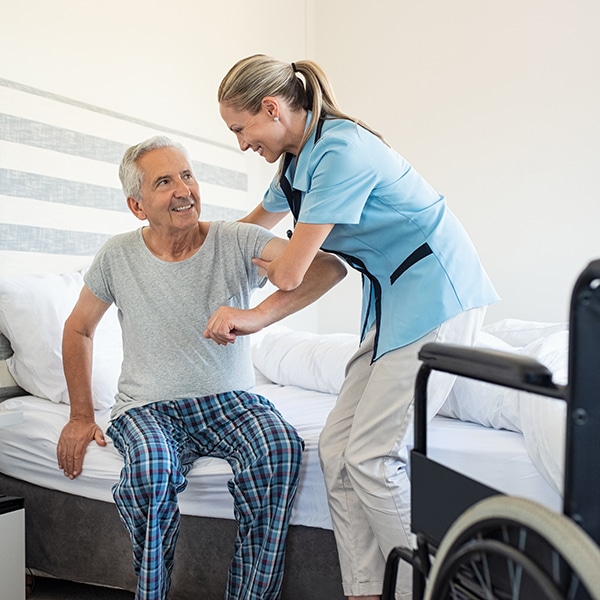Caregivers and Parkinson's Disease
Someone with Parkinson’s disease needs a particular kind of caregiver. The caregiver of a Parkinson’s patient must be knowledgeable about the numerous facets of the disease and how it affects each individual in order to provide efficient home care.
A devoted caregiver must be well aware of what to watch out for with Parkinson’s as well as the overall role they will play in enhancing the quality of life for someone with the debilitating disease because Parkinson’s treatment is highly specific to each individual.
What is Parkinson’s Disease?
Parkinson’s disease is a long-term, progressive condition that damages the brain’s motor control cells. The National Parkinson’s Foundation estimates that 1 million Americans have the condition.
The disease especially attacks the brain’s nerve cells and the central nervous system. Parkinson’s disease affects the cells that produce dopamine; when these cells die, it leads to nerve misfirings, which is why people with Parkinson’s disease have slowed movement, trembling, and loss of balance.
There are many aspects of Parkinson’s disease that make it challenging to manage. First of all, there is no known cure for Parkinson’s disease, therefore changing one’s lifestyle is the only option to help with symptoms right now.
In addition, there is no known cure for Parkinson’s disease, and clinicians frequently struggle to identify patients with the condition because there are no particular tests available. Instead, many medical professionals rely on the T.R.A.P. approach, which focuses on four aspects of the movement condition.
This approach involves looking for:
- At-rest trembling or shaking
- The doctor feels rigidity in the wrist.
- When you swing your arm, you have akinesia, which is a lack of or slowness of movement.
- Postural instability, which necessitates holding on to something in order to maintain balance when standing or rising
Although this technique is trustworthy, it also necessitates that the doctor be aware of a number of variables that could influence the outcomes, such as specific prescriptions and preexisting diseases.
How Can Family Members Help?
Since each person with Parkinson’s will experience the disease differently and need a distinct change in lifestyle, the most irritating aspect of the disease is frequently the fact that there is no one universal way to reduce symptoms.
Being in constant contact with your family member with Parkinson’s disease gives you the advantage of being able to better understand their unique needs and assist them in taking steps to enhance their quality of life. You can concentrate on a few particular areas to assist someone who has Parkinson’s.
MEDICATION SUPPORT
Parkinson’s medication is made to alter the biochemistry of the brain to help with symptom relief, but in order for it to be effective, a strict regimen must be followed.
Increased rigidity or tremors might be brought on by being even a few minutes early or late. As the caregiver, you may ensure that they take their meds as prescribed and relieve them of one worry.
In order to create a trustworthy and efficient medication plan, you will need to be informed of all the medications your family member is taking to treat other conditions, such as depression or sleeplessness.
Home care professionals with Aaron Home Care can make sure the senior is reminded at the right time of day to take their medications.
PLAY AND FITNESS THERAPY
Recent research and mounting data suggest that regular exercise can be virtually as beneficial as medicine at reducing Parkinson’s symptoms. By encouraging your loved one to exercise on a regular basis, you may assist maintain their bones and joints flexible and active, which benefits their neurological health.
As a family caregiver, you can encourage or support your loved one to seek out expert physical therapy to lessen the symptoms of Parkinson’s disease.
While most individuals only think about physical therapy after an injury, Parkinson’s patients can include it in a daily workout schedule to maintain their mobility as they age.
Home care professionals with Aaron Home Care can help by making sure Parkinson’s clients complete daily walks, or other exercise regimens.
OBSERVATION
Undoubtedly, the most crucial area in which professional caregivers may help someone with Parkinson’s is the third and last one.
Having a consistent outside observer is extremely helpful because this condition is so personalized and treatment options are determined by how the sickness is affecting the body.
Professional caregivers and family members can act as a second set of eyes for the doctor to look out for changes in:
- Symptoms: One significant change you will be watching for is any advancement of current symptoms. Parkinson’s medications are tailored specifically to each person’s symptoms. If you are taking the medications as prescribed and you discover that your loved one’s symptoms are growing worse, you should let their primary care doctor know right away so they can change the medicine.
- Mood: Given that depression affects more than 50% of Parkinson’s patients, many doctors are unsure whether depression qualifies as a significant symptom of the disease. In addition to depression, keep an eye out for a rise in tension or anxiety, and inform their primary doctor of any changes. If their doctor is aware of these changes, your client might benefit from being prescribed anti-depressants.
- Sleep: People with Parkinson’s disease generally struggle to keep to a regular sleep routine. They frequently feel exhausted and sluggish throughout the day due to their disruptive symptoms and stringent drug regimen, but they are still unable to fall asleep at night. Parkinson’s patients find it challenging to maintain their exercise or physical treatment routines due to a lack of energy, which has a negative impact on their general health. Inform your doctor if you have any issues sleeping so they can change your prescription as needed.
COMPANIONSHIP
Depression, anxiety, and other challenging mental illnesses have been discovered to be experienced by people with Parkinson’s, adding to the burden of the disease. It has also been discovered that the symptoms may worsen as a result of the additional stress. Many people who have been diagnosed with Parkinson’s have discovered that talking about their diagnosis and the symptoms they battle with can reduce some of the emotional strain the person with Parkinson’s is experiencing.
Home care can offer someone with Parkinson’s disease priceless companionship services.
Home care professionals are in a position to make a significant impact on the life of the person they care for if you can be someone they can talk to throughout the day and support them in their struggle for a higher quality of life.
Your part as a family caregiver is crucial.
You will be able to significantly improve the quality of life of a Parkinson’s patient in a more significant way than their primary physician.
While the doctor is ultimately in charge of diagnosing, prescribing, and managing the patient’s treatment options, you, as the family caregiver, can give the doctor more information that will enable them to better care for your loved one.
Parkinson’s disease is highly individualized, thus the primary care doctor for your loved one will rely on your observations and wisdom.
You may be assured that your loved one with Parkinson’s can make the most of their life now that you are aware of what to look out for and how you can actively contribute to improving their quality of life.
Adding home care services can significantly assist families and seniors with a better quality of life.
Call Aaron Home Care today to learn how we can help you and your aging loved one. (619) 880-5522
Aaron Home Care serves La Jolla, Pacific Beach, Point Loma, San Diego, UTC, La Mesa, Chula Vista, Coronado, Bonita, Eastlake and the surrounding areas.
In 1999, Aaron was named Residential Program Manager of a group home for disabled adults in Arlington, Virgina. Here, he built a reputation for being compassionate with his clients and efficient in company operations. In the years that followed, Washington DC’s human services field went through unprecedented reform when the city was fined $11 million for the previously unchecked abuse, neglect, and exploitation of the very population it was supposed to protect. In 2005, Aaron was selected by a watchdog company to co-create and implement a monitoring system to safeguard and advocate for the system’s most vulnerable residents. This system is still in use today.
Aaron is now using his unique gifts and profound experience in the human service field to provide San Diego County Seniors with dependable, compassionate caregivers through Aaron Home Care.
He currently serves on the board of the San Diego Regional Home Care Council and is an active member of the Senior Advocate Network of San Diego.
Aaron Home Care is a member of the American Board of Home Care and is accredited by the Better Business Bureau.
- 5 Things That Will Make Hot Weather Easier For Seniors With Diabetes - July 25, 2024
- How Engaged Coloring Can Help With Dementia - July 8, 2024
- Helping Seniors Embrace Rehabilitation After a Hospital Stay - June 26, 2024







